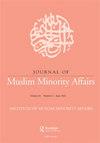Heartbreaking vs. Heartwarming Facebook Advertisements by Nonprofits to Help the Rohingya Refugees
IF 0.4
0 RELIGION
引用次数: 1
Abstract
Abstract It is a common observation to see Muslim communities affected by violence and mass migrations. This is often followed by international nonprofits running online campaigns to receive charitable donations. Specifically, the Rohingya refugee crisis spurred Facebook advertisements based on negative emotional appeals. We argue that such advertisements make viewers emotionally numb to the victims. We propose that viewers will respond more altruistically when presented with solutions-oriented information. To test this assumption, we conducted a between-group experiment (n = 102) manipulating message valence (positive vs. negative) of a Facebook advertisement. Results indicate that participants in the positive condition expressed more positive emotions and that nonprofits should cease creating heartbreaking advertisements when similar levels of empathy can be evoked from heartwarming advertisements. Participants in both conditions expressed similar empathy, trust, and intentions to donate. The study offers implications to positively frame the Muslim communities affected by violence on social media.非营利组织帮助罗兴亚难民的脸书广告令人心碎
摘要穆斯林社区受到暴力和大规模移民的影响是一种常见的现象。紧随其后的往往是国际非营利组织开展在线活动,接受慈善捐款。具体而言,罗兴亚难民危机引发了基于负面情绪诉求的脸书广告。我们认为,这样的广告会让观众对受害者情感麻木。我们建议,当观众看到面向解决方案的信息时,他们的反应会更加无私。为了验证这一假设,我们进行了一个组间实验(n = 102)操纵Facebook广告的消息效价(正与负)。结果表明,处于积极状态的参与者表达了更积极的情绪,当暖心广告能唤起类似程度的同理心时,非营利组织应该停止制作令人心碎的广告。两种情况下的参与者都表达了相似的同理心、信任和捐赠意愿。这项研究为积极界定受社交媒体暴力影响的穆斯林社区提供了启示。
本文章由计算机程序翻译,如有差异,请以英文原文为准。
求助全文
约1分钟内获得全文
求助全文
来源期刊

Journal of Muslim Minority Affairs
RELIGION-
CiteScore
1.40
自引率
0.00%
发文量
31
期刊介绍:
Journal of Muslim Minority Affairs is a peer reviewed research journal produced by the Institute of Muslim Minority Affairs (IMMA) as part of its publication programme. Published since 1979, the journalhas firmly established itself as a highly respected and widely acclaimed academic and scholarly publication providing accurate, reliable and objective information. Journal of Muslim Minority Affairs provides a forum for frank but responsible discussion of issues relating to the life of Muslims in non-Muslim societies. The journalhas become increasingly influential as the subject of Muslim minorities has acquired added significance. About 500 million Muslims, fully one third of the world Muslim population of 1.5 billion, live as minorities in 149 countries around the globe. Even as minorities they form significant communities within their countries of residence. What kind of life do they live? What are their social, political and economic problems? How do they perceive their strengths and weakness? What above all, is their future in Islam and in the communities of their residence? The journal explores these and similar questions from the Muslim and international point of view in a serious and responsible manner.
 求助内容:
求助内容: 应助结果提醒方式:
应助结果提醒方式:


